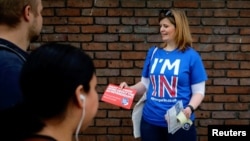British business competitiveness will suffer if Britons vote to leave the Europe Union, the head of the World Trade Organization warned during a visit to London on Tuesday.
WTO Director General Roberto Azevedo joins a chorus of international figures, including Bank of England Governor Mark Carney and International Monetary Fund (IMF) chief Christine Lagarde, who have said that a British exit from the EU would have damaging economic consequences.
Two polls published Tuesday show Britons narrowly favor remaining in the EU, in contrast to surveys released Monday, which showed the campaign for Brexit ahead.
Such divergent polls have made it difficult to predict the outcome of the June 23 vote on whether Britain should remain part of the EU, a choice with far-reaching consequences for politics, the economy, defense, diplomacy and trade.
"While trade would continue, it could be on worse terms," Azevedo said of a vote to leave the EU. "Most likely, it would cost more for the UK to trade with the same markets, therefore damaging the competitiveness of UK companies," he said in a prepared text of his speech.
Britain gets preferential export terms for 60 percent of the goods it sells abroad – including the 47 percent of its exports that go to the EU and the 13 percent that go to other countries with EU trade deals.
"The implication is that UK exporters would risk having to pay up to 5.6 billion pounds” [or $8.2 billion] each year in duty on their exports."
Renegotiations likely
Azevedo already has said that Britain would have to renegotiate its relationship with the rest of the World Trade Organization, which could take years or decades, and he reiterated that it would not be a simple job.
"Key aspects of the EU's terms of trade could not simply be cut and pasted for the UK," he said.
Britain might also need to negotiate at the WTO to keep other rights currently bound up with its EU membership, such as free movement of people and the right to run public utilities as monopolies, he said.
Azevedo, who was a Brazilian trade negotiator and ambassador before taking over at the WTO, said he wanted to offer insight as someone with a lifelong career of brokering trade deals.
Trade negotiations were highly complex and required potential partners to put in place a competent negotiating team. But running several negotiations at once would make things even more challenging.
"Moreover, if you need to complete a deal quickly when the other side can wait, you are negotiating from a very weak position," he said. "So, on this basis, it could take quite some time before the UK got back to a similar position that it has today in terms of its trading relationships with other countries."





